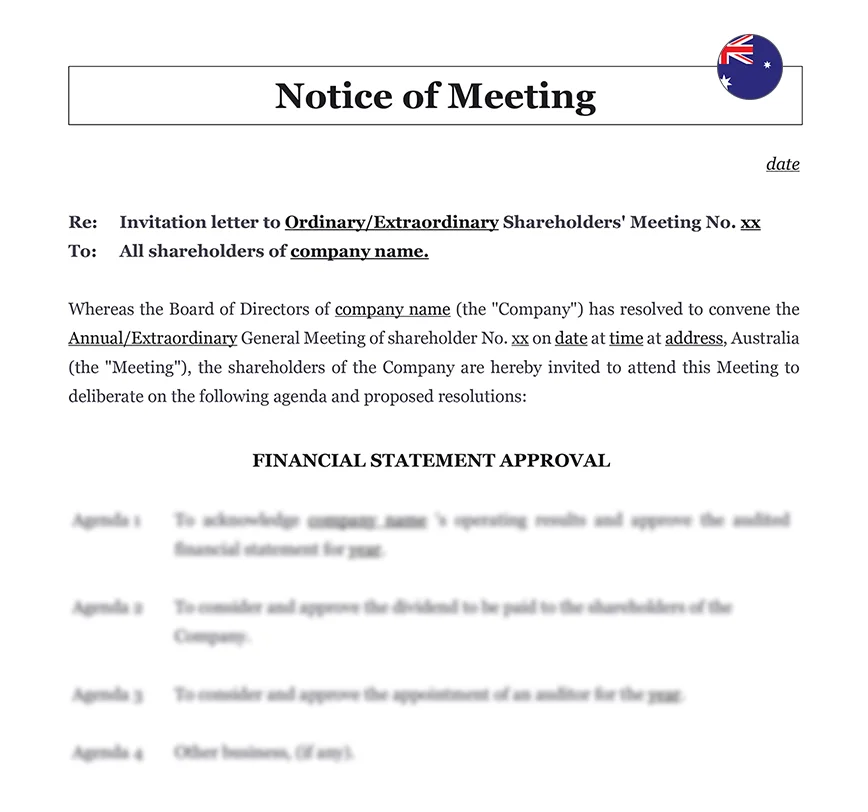Ready to use legal template
Drafted by experienced lawyers
Compliant with Australian law
Ready to use legal template
Drafted by lawyers
Compliant with Australian law
Home › Business contracts › Notice of meeting
Learn more about Notice of Meeting in Australia
A Notice of Meeting is a formal document issued by a company or organization to its members or stakeholders, informing them of an upcoming meeting. In Australia, a Notice of Meeting typically includes details such as the meeting date, time, location, agenda items, and any relevant documents to be discussed or voted on during the meeting. It serves as an official communication tool to ensure that all concerned parties are aware of the meeting and its agenda, allowing them to prepare adequately and participate effectively. Our easy-to-edit templates streamline the document preparation process, ensuring that you have professionally crafted documents at your fingertips, ready to be customized to your unique needs.
Table of contents
-
What is the purpose of issuing a Notice of Meeting in Australia?
-
What are the legal requirements for issuing a Notice of Meeting for companies?
-
How far in advance should a Notice of Meeting be sent to stakeholders in Australia?
-
What information should be included in a Notice of Meeting in Australia?
-
Can a Notice of Meeting be issued electronically in Australia?
-
Are there any specific rules regarding the format of a Notice of Meeting in Australia?
-
What steps should be taken if a stakeholder does not receive a Notice of Meeting?
What is the purpose of issuing a Notice of Meeting in Australia?
In Australia, the purpose of issuing a Notice of Meeting is to inform stakeholders, such as shareholders, directors, and members, about an upcoming meeting of a company or organization. The notice serves as formal communication, providing stakeholders with essential information about the meeting agenda, date, time, and location. Issuing a Notice of Meeting ensures transparency, compliance with corporate governance standards, and allows stakeholders to participate effectively in decision-making processes.
What are the legal requirements for issuing a Notice of Meeting for companies?
Under Australian corporate law, companies are required to comply with specific legal requirements when issuing a Notice of Meeting. These requirements typically include:
1. Providing reasonable notice to stakeholders
2. Including essential information such as the meeting agenda, date, time, and location
3. Compliance with the company’s constitution or articles of association
4. Adhering to any additional requirements outlined in relevant legislation, such as the Corporations Act 2001
Failure to meet these legal requirements may result in the meeting being deemed invalid, and decisions made at the meeting may be challenged.
How far in advance should a Notice of Meeting be sent to stakeholders in Australia?
The Corporations Act 2001 specifies that a Notice of Meeting must be sent to stakeholders within a reasonable time frame before the meeting. While the Act does not prescribe a specific timeframe, it is generally recommended to provide stakeholders with at least 21 days’ notice for annual general meetings and 14 days’ notice for other types of meetings. However, the company’s constitution or articles of association may impose additional requirements regarding the timing of notice.
What information should be included in a Notice of Meeting in Australia?
To ensure compliance with Australian corporate governance standards, a Notice of Meeting should include the following information:
| ➤ Date, time, and location of the meeting |
| ➤ Agenda items and proposed resolutions |
| ➤ Details of any special business to be transacted |
| ➤ Proxy voting instructions |




